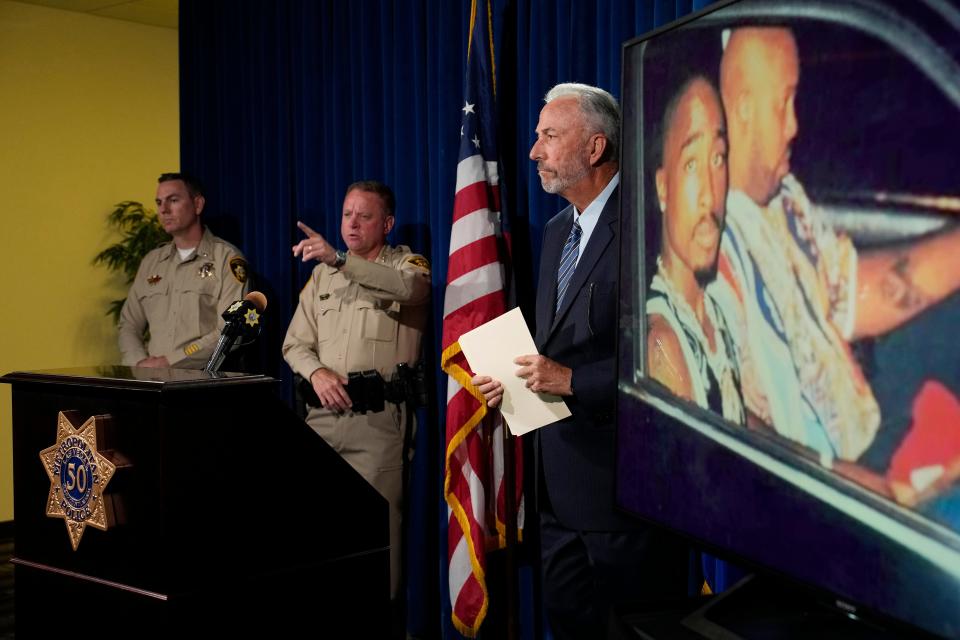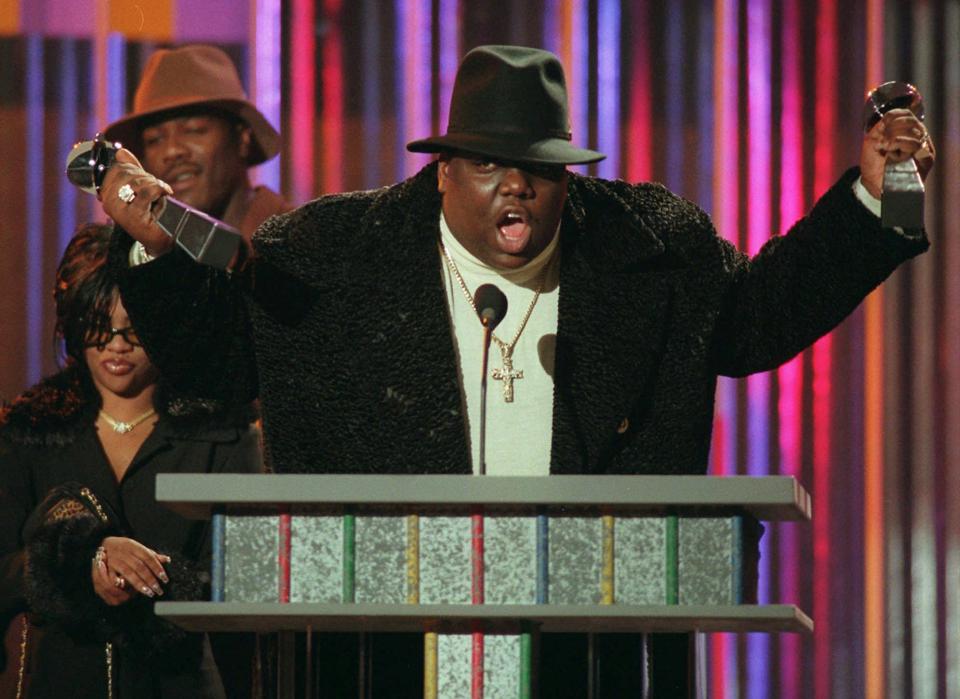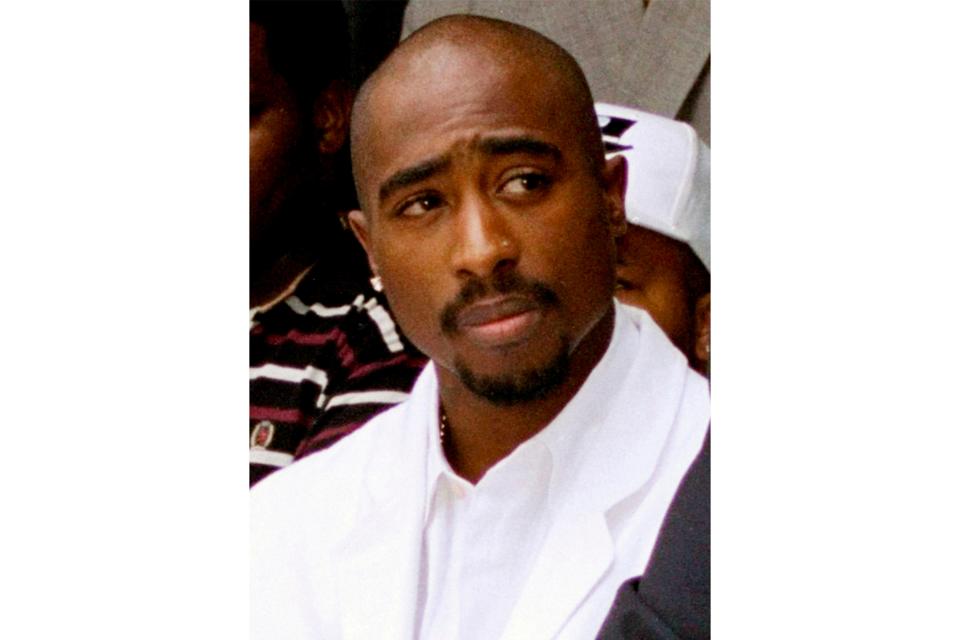Suspect arrested in Tupac Shakur's 1996 killing: A timeline of rapper's death, investigation
A recent arrest in the investigation of rap icon Tupac Shakur's death signals a major breakthrough in the long-unsolved killing.
A Nevada grand jury indicted Duane "Keffe D" Davis in Shakur's death, prosecutors announced in court Friday, charging Davis with murder with use of a deadly weapon in the killing of the rapper. Up until Davis' indictment, no arrests had been made in the 27-year-old case.
The investigation into Shakur's death started Sept. 7, 1996, but "it is far from over," said Kevin McHahill, sheriff of the Las Vegas Metropolitan Police Department, during a press conference last week. "It has taken countless hours, really decades of work by the men and women of our homicide section to get to where we are today."
From the fatal drive-by shooting of Shakur to Davis' arrest, here's everything to know about the investigation.

November 1994: Tupac Shakur robbed, shot several times at New York hotel
Two years prior to his death, Shakur was wounded in a shooting during a robbery in the lobby of a midtown Manhattan hotel in November 1994. He was shot several times and lost $40,000.
Shakur openly accused rappers The Notorious B.I.G. and Sean "Diddy" Combs of having prior knowledge of the shooting, which both vehemently denied. The shooting sparked enough of a feud that created a serious divide in the hip-hop community and its fans.
TUPAC DEATH: Duane 'Keffe D' Davis indicted on murder charge for Tupac Shakur 1996 shooting
Sept. 7, 1996: Tupac Shakur shot in fatal drive-by shooting
Shakur was traveling in a black BMW driven by Death Row Records founder Marion "Suge" Knight in a convoy of about 10 cars, apparently headed to a nightclub, after watching Mike Tyson knock out Bruce Seldon in a championship fight at the MGM Grand in Las Vegas.
Following the match, Shakur, Knight and associates were involved in a fight at the hotel with a group that included Duane "Keffe D" Davis and his nephew Orlando "Baby Lane" Anderson, with whom Shakur had clashed before. Surveillance video showed Shakur and Knight kicking and punching Anderson near a bank of elevators, Las Vegas police said.
Davis and Anderson were members of the South Side Compton Crips, a Southern California-based gang that were rivals of Knight's Blood-affiliated gang, Mob Piru, police said.
That night, while driving down the Las Vegas Strip, a white Cadillac with four men inside pulled alongside the BMW while it was stopped at a red light. One person opened fire, riddling the passenger side of Knight's car with bullets, police said. Sitting in the passenger seat, Shakur was shot four times, at least twice in the chest. Knight was grazed by a bullet fragment or shrapnel from the car.
Police alleged at the Sept. 29 news conference that Davis was sitting in the Cadillac's passenger seat and handed a gun he'd obtained to one of the men in the back as retaliation for the casino fight earlier.
Shakur was rushed to a hospital, and in the days that followed, Shakur would have a lung removed and remain on a respirator in intensive care.
Sept. 13, 1996: Tupac Shakur dies from injuries sustained in shooting
Shakur died six days after the shooting. He was 25.
November 1996: Tupac Shakur associate and eyewitness Yaki Kadafi dies
Two months following Shakur's death, on Nov. 10, 1996, Yafeu Fula (aka Yaki Kadafi) – a member of Shakur's rap group Outlawz – was shot and found dead at a housing project in Orange, New Jersey, according to a Los Angeles Times report.
Fula was traveling with bodyguards in the car behind Shakur's on the night of the rapper's death, per the outlet.
March 9, 1997: Tupac Shakur's East Coast rival The Notorious B.I.G. dies in shooting
Six months after Shakur's death, the rapper's musical rival Christopher "Notorious B.I.G." Wallace was fatally shot in March 1997. Both rappers were in the middle of the infamous East Coast-West Coast rivalry, which defined the hip-hop scene during the mid-1990s.

The New York-born Shakur represented the West Coast after he signed with the Los Angeles-based Death Row Records. He often traded verbal jabs with New York natives B.I.G. and Sean Combs, who hailed from the East Coast representing New York City-based Bad Boy Records.
Diss tracks were delivered to drive home their ferocious points across. Shakur released the aggressive single "Hit 'Em Up," which took aim at B.I.G., who on the other hand returned with "Who Shot Ya?" ? a record that was received as a taunt. Still, B.I.G. claimed the song was not directed toward Shakur.
'Straight Outta Compton' to '8 Mile': Essential hip-hop movies to celebrate 50 years
September 1997: Tupac Shakur's mother files wrongful death lawsuit
Shakur's mother, Afeni Shakur, filed a wrongful death lawsuit against Orlando Anderson on Sept. 12, 1997, alleging he was responsible for the shooting death of her son, according to the Los Angeles Times. Days earlier, Anderson filed his own lawsuit, per the outlet, claiming he was assaulted by Shakur and several Death Row Records employees in the lobby of the MGM Grand Hotel hours before the rapper’s death.
Anderson denied involvement in Shakur's killing at the time. He died two years later in an unrelated gang shooting in Compton, California.
February 2018: Netflix's airing of Tupac, Biggie true crime series renews investigation
In 2018, Netflix aired "Unsolved: The Tupac and Biggie Murders," a USA Network true-crime anthology series that looked at separate investigations into Shakur's shooting death.
A law enforcement official briefed on Shakur's death investigation told ABC News that the investigation gained momentum following the series' release.
Who is Duane 'Keefe D' Davis? What to know about man arrested in Tupac Shakur's killing
July 2023: Home of Duane Davis' wife raided following release of tell-all memoir

In a 2018 BET interview, Davis admitted to being in the front seat of Shakur's shooters' vehicle and implicated his nephew Anderson, saying he was one of two people in the backseat. Davis said the shots were fired from the back of the car, though he stopped short of naming the shooter, saying he had to abide by the "code of the streets."
Davis further opened up about his association with Shakur's death in the 2019 tell-all memoir "Compton Street Legend." In the book, Davis said he broke his silence over the rapper's killing in 2010 during a closed-door meeting with federal and local authorities. At the time, he was 46 and facing life in prison on drug charges when he agreed to speak with authorities.
Four years after the memoir's release, Las Vegas police raided the home of Davis' wife in July 2023 in Henderson, Nevada. Documents state police were looking for items "concerning the murder of Tupac Shakur." Lt. Jason Johansson revealed during the Sept. 29 press conference that police found evidence "that corroborated information obtained through our investigation."
Police reported collecting multiple computers, a cellphone and hard drive, a Vibe magazine that featured Shakur, several .40-caliber bullets, two "tubs containing photographs" and a copy of "Compton Street Legend."
More: Tupac's sister tearfully accepts late rapper's posthumous Hollywood Walk of Fame star
Sept. 29, 2023: Duane Davis arrested for murder in Tupac Shakur shooting
Davis was arrested Sept. 29 while on a walk near his home, Chief Deputy District Attorney Marc DiGiacomo said. Davis' murder indictment was revealed hours later. DiGiacomo said a grand jury had been seated in the case for "several months."
"I know a lot of people have been watching and waiting for this day," Clark County District Attorney Steve Wolfson said at a press conference the same day. "Tupac Shakur is a music legend and for a long time, this community and worldwide have been wanting justice for Tupac. Today we are taking that first step."
Contributing: Bill Keveney, USA TODAY; The Associated Press
Opinion: Why arrest in Tupac Shakur's murder means so much to so many
This article originally appeared on USA TODAY: Tupac Shakur suspect arrested: Timeline of 2Pac murder, investigation
